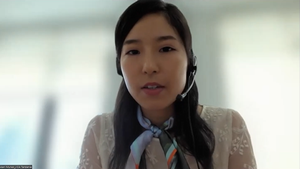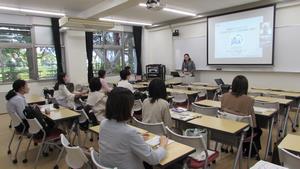- Global Collaboration Center
- Activity
- The report on 28th SDGs (Sustainable Development Goals) Seminar “International Cooperation as a Career: Diving into Rural Development with No Experience”(May 2023)
ページの本文です。
The report on 28th SDGs (Sustainable Development Goals) Seminar “International Cooperation as a Career: Diving into Rural Development with No Experience”(May 2023)
2024年4月15日更新
On May 16, 2023, we invited Ms. Akari Murao of the Japan International Cooperation Agency (JICA) Tanzania Office to hold the 28th SDGs Seminar titled "International Cooperation as a Career: Diving into Rural Development with No Experience." After graduating from the Department of Human Life Studies, Faculty of Human Life Studies, Ochanomizu University, Ms. Murao joined JICA and has worked in three departments to date. At the seminar, she provided an overview of JICA, the work she has done at the Japan Overseas Cooperation Volunteers Secretariat, the Economic Development Department, and the Tanzania Office, as well as her career and the challenges she anticipates in the future.
Ms. Murao began the seminar by explaining JICA’s mission and projects. She stated that JICA supports nation-building by involving various stakeholders in addressing problems in developing countries, which are often not caused by a single factor but are intertwined. Additionally, she mentioned that JICA staff involved in international cooperation projects often play the role of facilitators, working with and bringing together various partners, including Japanese ministries, international organizations, domestic and international private companies, experts, consultants, and educational institutions to carry out these projects.
Ms. Murao continuously explained her work at JICA in detail. In her first year at JICA, before being assigned to a specific workplace, she spent three months in on-the-job training (OJT) at the office in Fiji, which is located in Oceania. This experience not only taught her how to build trusting relationships with local people and ensure safety in developing countries, but also allowed her to gain knowledge in various fields such as health, medicine, education, and the environment while working with actual members of the international cooperation team. Her first assignment was at the Japan Overseas Cooperation Volunteers (JOCV) Secretariat. She was responsible for supporting the activities of JOCV deployed to 10 countries in the Pacific region, as well as planning deployments, recruiting, and selecting health sector JOCV personnel for all regions. Since the volunteers will be working in developing countries for two long years, she felt strong pressure to be deeply involved in their lives. After working at the JOCV Secretariat, she was assigned to the Economic Development Department, which is responsible for formulating, supervising and evaluating various projects based on specific sectors and issues. This is the core of JICA's initiatives, and she was particularly responsible for agriculture and rural development projects in Myanmar. She recalled that this period was the toughest since she joined JICA. During that time, she managed more than 10 projects every day singlehandedly and struggled with unfamiliar agricultural terminology. On the other hand, she says that the best part of work there was to be able to present issues, to work with colleagues and local collaborators to create a process for solving those issues, and to gradually see the results, which put her in the spotlight. Currently, she is working at the JICA office in Tanzania, one of approximately 100 JICA overseas offices around the world. She is responsible for supervising the implementation of loan and grant aid, as well as technical cooperation in the country, with a focus on areas such as agricultural and rural development and fisheries cooperation. This involves understanding and analyzing the needs identified through dialogue with local stakeholders and information obtained through direct contact, made possible by living in the country. Additionally, when hosting dignitaries from both within and outside Tanzania, as well as during discussions with Tanzanian government officials, she serves as a guide at the cooperation sites, conveying the strengths of Japan and JICA projects. (For an overview of JICA projects in Tanzania, please refer to the link at the end of this report.)
Ms. Murao said that one of the challenges she realized through visiting various countries was the approach taken in the agricultural sector. She wants to jump into the field despite having no prior experience, which reflects her passion for solving these challenges. Even though she is assigned to different departments every few years, her eagerness to learn, regardless of location or field, makes her devoted to her work, allowing her to make full use of the knowledge and experience she had gained in each department. I was strongly impressed by Ms. Murao’s thoughts on the future challenges in her career. She expressed her desire to continue being involved in nation-building, both in Japan and abroad, by working on problem-solving that addresses the intersection of social issues. I would like to take this seminar as an opportunity to pay closer attention to social issues, consider the various combinations that exist, and think about what I can do to help solve them.
(Yumi Ito, master student, The Graduate School of Gender and Social Sciences)
【Related link】
Activities in Tanzania (JICA website)












